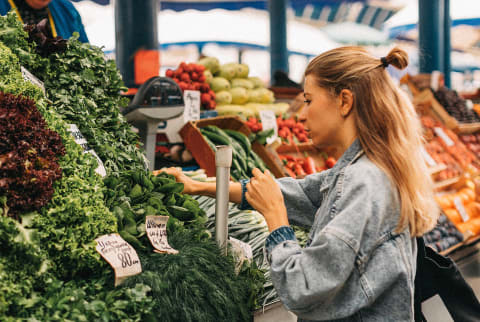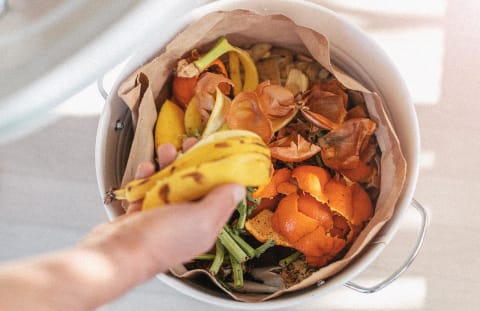Advertisement
How Your Meals Can Be Votes For The Planet

It's 2020 and there's no denying that human activity plays a major role in the climate crisis we are facing. A growing body of evidence supports the fact that our food system is one of the biggest contributors and, if we want to do everything we can to save the planet we inhabit, we need to change what we're putting on our plates.
Instead of feeling disheartened, let's use this as a source of empowerment. It means that every single day we have at least three opportunities to vote for the planet: breakfast, lunch, and dinner.
When you're planning your meals, going to the grocery store (or placing your online order from home!), ordering from restaurants, and cooking, your decisions are likely to have a bigger impact on the planet than you might think.
Your plate + planetary health.
When it comes to our plate, the animal products we consume have been shown to have an outsized impact on our climate footprint. While it's hard to measure exactly how much conventional animal agriculture contributes to climate change, a 2009 report by the Worldwatch Institute estimates the proportion of global warming that can be attributed to livestock-related emissions (including respiration by livestock, land use, methane, and more) is a huge 51%. The UN's Food & Agriculture Organization puts this number at closer to 15%. Any way you cut it, raising animals for food requires a ton of resources, and it will only become more taxing as the world's population continues to grow.
The lesson? Consuming fewer animal products is one of the fastest and simplest ways to reduce your climate footprint every single day. And believe us when we say it's more doable than you think.
The sustainable-for-you way to eat sustainably.

Consuming fewer animal products does not have to mean going vegan. In fact, gradually cutting back on the amount of meat, dairy, and eggs in your diet may have a bigger impact than cutting meat entirely because it will be easier to stick to in the long term.
One simple and empowering way to think about it is to consider each of your meals as a vote. Each time you choose a plant-based meal, you cast a vote for the planet.
If you're feeling a little lost when it comes to what to eat, start by looking at the animal products in the meals you have on rotation and look around for a plant-based alternative. We're living in the golden age of plant-based eating, with an abundance of clever products like plant-based cheeses, milk alternatives, and meat substitutes.
One of our favorite new kids on the plant-based block is JUST Egg: A 100% plant-based egg alternative that scrambles just like the eggs we eat from chickens. This simple swap can make a huge difference to your sustainable footprint. Given the number of crops needed to feed chickens, it takes 51 gallons of water to produce a single egg. Since JUST Egg is made directly from one of the most water-efficient summer crops—the mung bean—it uses 98% less water. It also uses 93% less CO2e and 86% less land!
So, whether you're craving an egg sandwich from breakfast, looking to whisk up some crepes for dessert, or creating a veggie-filled omelet for a fast and easy dinner, JUST Egg offers a simple, delicious way to vote for the planet every single day.
Finally, remember to consider taste and texture when you're searching for swaps. If you're craving meat, it's unlikely a potato is going to cut it. But a mushroom, with its meaty texture and ability to absorb umami flavor, can make for a delicious burger alternative that will leave you, your taste buds, and the planet happy.
Beyond the plate.

Creating a more sustainable day on a plate doesn't end with what you eat. Consider each step in your food cycle—from grocery shopping to cleaning up—and think about how you could place your vote in favor of planet Earth.
In America, where some estimates show roughly 20% of the food gets wasted by consumers, simply being more mindful of the amount of food you buy and finding ways to eat, share, or freeze your leftovers will go a long way to lessen your climate footprint.
When it comes to the bits you can't eat like tops and stalks and rind, composting at home (it doesn't have to be hard or smelly!) can help cut emissions. When composted, organic material can help grow crops, but when food is tossed in landfill with other garbage, it decomposes and releases methane into the atmosphere1, warming the planet.
Remember, small shifts can make a big difference. Whether you choose a JUST Egg breakfast sandwich, opt for oat milk in your coffee, or swap your beef burger for mushroom, you're voting for the planet.
